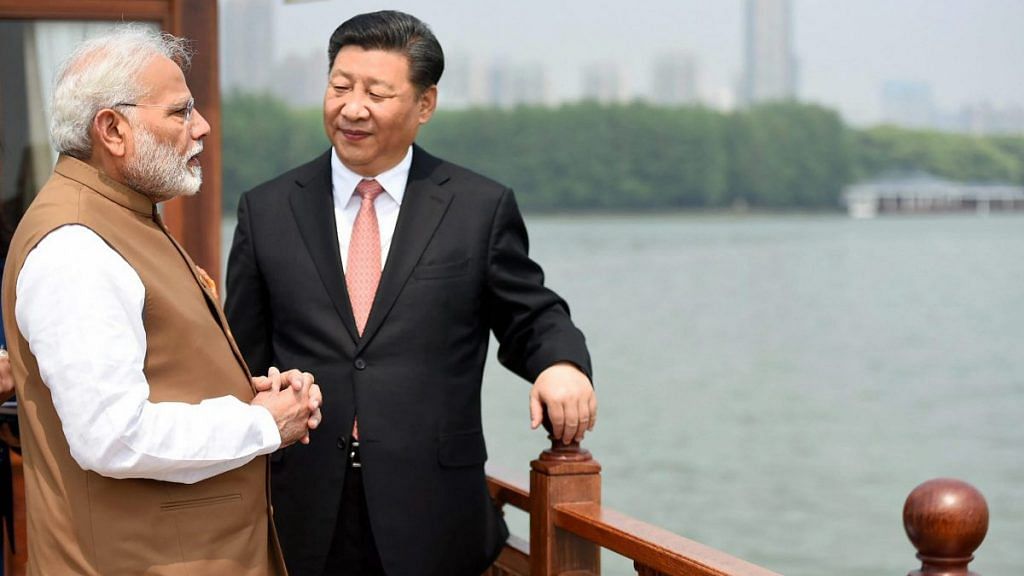A fundamental decoupling with China is inevitable not only for India but for many other countries. The deep integration of the global economy, with China as a central player and the world’s factory, led many to assume that decoupling with China is impossible or at least unlikely. But that process has already begun, as former US National Security Advisor John Bolton recently said.
This decoupling with China is only likely to accelerate as an increasingly paranoid and authoritarian Chinese Communist Party (CCP) and the Xi Jinping government seek greater control over the Chinese population, as well as the outside world.
Also read: Modi’s bid to sway China’s Xi with personal outreach was a big error. India’s paying for it
India’s role in decoupling
Indian policy has helped this process, most recently by banning 59 Chinese apps, a move that others are now following. But the Narendra Modi government sees such measures more as retaliation, in this case against China’s unacceptable behaviour in Ladakh. The government does not appear to recognise that international politics is spiralling towards a cold war, or even worse, a “soft war”, as some Chinese analysts are calling it.
Whatever it is, what is incontrovertible is that this will drive the world towards a differently structured global economic order than what we have seen for the last three decades. Recognising these changes would require India to go much beyond banning just apps or stopping some questionable investment.
Indian policy should be based on the assumption that the fundamental global economic decoupling currently underway will inevitably go much farther and affect both India and the rest of the world.
Also read: Don’t suffer alone — India and the world need to act against China’s intimidation tactics
What coupled the world economy
Decoupling is inevitable because linkage politics is a defining feature of international competition and conflict. This decoupling is linked, paradoxically, to the coupling of all issues to security and political competition in the new soft war. Ultimately, countries put their security interests ahead of their economy because without security, there is little point in generating wealth. When the chips are down, security politics trumps economics.
The current global economic coupling was based on the assumption that, minimally, economic and security issues are delinked. More hopefully, it was based on the assumption, long a liberal-internationalist fantasy, that economic incentives would actually alter political calculations, which suggests a far more consequential coupling that changes calculations of national interest. Needless to say, this proved to be as foolish an expectation when it was first made in the run-up to World War I as it has been regarding China’s behaviour.
Also read: Xi contained Covid-19, but suppressing rising chorus against China won’t be easy
Rattled China can’t blame others
The prospect of a significant decoupling has clearly rattled the Chinese leadership. Foreign Minister Wang Yi has said that the US and China “should stop attempts at decoupling and advance the relationship through cooperation”, while the Chinese Ambassador to the US Cui Tiankai warned that the relationship was at a “critical moment”. Chinese Ambassador to India Sun Weidong also warned New Delhi that a “forced decoupling is against the trends & will only lead to a ‘lose-lose’ outcome”.
But it is Beijing that caused this shift. China has repeatedly attempted to use its economic heft to punish other countries and force them to obey its diktats. China’s use of economic coercion has become the “new normal”. After repeatedly exploiting economic coupling for political gains, it is a bit rich for China to now complain that others are decoupling. They have little choice because China is leaving them with none.
Not only has China used its economic clout unabashedly, it has also attempted to generate even more clout by unfair means, such as domestic subsidies, taxes and weak regulations on top of the natural advantage it has in low wages. In one critical example, China has used such methods to become the key supplier of rare earths, as a recent report pointed out. China is attempting to do the same with 5G technologies, actively threatening other powers against banning Huawei. But now, other countries, including the US, Australia and Japan, are pushing back, a small but critical indicator of how the vulnerability that China deliberately creates as a political weapon is boomeranging.
Also read: India can’t free-ride others to limit China. It needs to lead the containment strategy
Decoupling hurts everyone, so what?
It should be noted that decoupling does not mean a complete economic divorce from China. The Cold War bipolar competition was, in this respect, the outlier: despite intense security competition, previous episodes of great power competition did not witness such complete economic estrangement. History may repeat itself but it is rarely going to be a carbon copy. The emerging cold war will likely look like something in-between these previous models, with more economic intercourse than the Cold War era but possibly far less than the pre-World War I period.
There is little doubt that decoupling will be neither easy nor inexpensive for India or China. Indeed, this is true for the entire global realm. China’s growth over the last two decades has made the whole world richer, not just China. And by the same measure, decoupling will hurt everyone, not just China. But that this is a tragic outcome does not make it any less likely.
This decoupling will not be limited to the economic realm either. We should expect this to spread to other areas, such as multilateralism and, of course, bilateral relations. To be sure, as in the economic arena, there will not be a complete decoupling in any of these areas. But active cooperation and coordination will become increasingly difficult, however much India wants to reach an “understanding”. Preparing for this inevitability is far more prudent than hoping against it.
The author is a professor in International Politics at Jawaharlal Nehru University (JNU), New Delhi. Views are personal.
